Revolutionary Communist Tendency
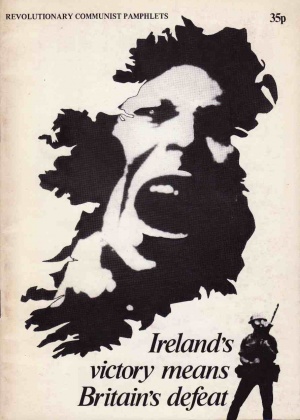
The Revolutionary Communist Tendency was a faction that formed in 1977 after being expelled from the Revolutionary Communist Group in 1976. It later changed its name to the Revolutionary Communist Party in 1981/2.[1]
From the beginning RCT members used 'party names' in addition to their own names. Thus Frank Richards and Mike Freeman were cover names for Frank Furedi and Michael Fitzpatrick. the RCT also created a number of front groups, a pattern the RCP and later the LM Network would continue. thus in 1977 and 1978 they had already formed the Smash the Prevention of Terrorism Act Campaign and Workers Against Racism, the latter of which carried on through the name change to the RCP. the former was replaced by the Irish Freedom Movement
Contents
Formation
The RCT originated in a split in the Revolutionary Communist Group in 1976. The RCG itself had been created following a split in the International Socialists (the forerunner of the Socialist Workers' Party) in the early 1970s. The grouping that became the RCT was expelled for opposing the attempt of the RCG to gain influence with the Communist Party of Great Britain and the Anti-Apartheid Movement. A right wing critic of the Left such as Blake Baker claims that the RCT was formed following the 'expulsion of a large minority of members in 1976 for attacking the Communist Party'.[2] Left critics, such as Denver Walker (a journalist at that time for the New Worker the paper of the New Communist Party), have a similar account: 'It was apparently their demand that the RCG publicly attack the African National Congress of South Africa... that led to the expulsion of the Tendency from its parent body'.[3]
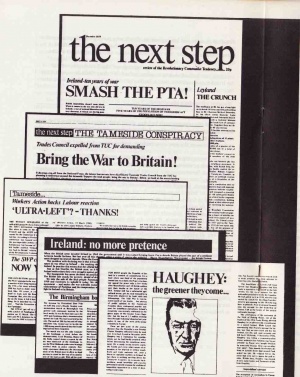
According to another account of its creation by John Sullivan a left critic of small left groups, but a lifelong socialist activist:
- THE RCT was expelled from its parent, the RCG, for challenging that group’s grovelling before the Communist Party and the Anti-Apartheid Movement on its way towards becoming a consistent defender of anti-working-class regimes. The RCG was then conducting entry work in Anti-Apartheid. The people who became the RCT wanted to criticise the African National Congress.[4]
Elsewhere Sullivan had written that the falling out also had an economic dimension:
- Yaffe’s plunge into full fledged Stalinism, combined with a disagreement over the mathematics in Capital with his chief lieutenant Frank Richards produced a split, [5] which eventually became the Revolutionary Communist Party (RCP).
Following the expulsion the expelled group seems to have split again around the time of the creation of the RCT with a small grouping called the Committee for a Communist Programme leaving according to some sources.[6]
At the time (1981) Sullivan put the strength of the RCT at 'around 70'[4], a figure with which Walker more or less concurs writing that the RCT 'perhaps' 60 members.[3] Sullivan wrote of the later development of the RCT/P:
- The new group declared itself anti-Stalinist, and took several steps sideways in an attempt to differentiate its product... The group dropped Yaffe’s hostility to the working class and adopted an agnostic attitude to the historic divide between Stalinism and Trotskyism. At first sight it is a much less repellent group than its parent, but its essential eclecticism has landed it in some strange company. Opponents translate the initials RCP as Ray Chadburn Party, after the leader of Nottinghamshire NUM, because of the group’s support for a ballot during the miners’ strike.[5]
- ... its weekly journal The Next Step... is a kind of Left wing answer to Marxism Today, sharing that journal’s eclecticism. ... What then gives the RCP’s eclectic mishmash the appeal which made it the fastest growing group of the 1980s, with a dynamism notably absent from both the RCG and the Discussion Group? The answer is style. The group is part of the harder aggressive, post-punk move away from peace and love and the average RCPer looks very different from the grotty SWPers. They have been described as "the SWP with hair gel", and many a parent, pleased at the improvement in their child’s appearance, has welcomed the move from one to another.[5]
One early observer (in an article published in the January 1978 edition of Marxism Today) noted that at that stage the RCT were almost indistinguishable from the RCG from which they had split:
- In recent months the RCG has not only suffered a breakaway—the Revolutionary Communist Tendency, or RCT—but also witnessed a further split within the breakaway—the Committee for a Communist Programme, or CCP. The rationale behind the splits does not seem to lie in any major disagreement on political orientation, but only over how sectarian the organisation should be towards other left groups, particularly the CPGB. For the purposes of this article, therefore, the three groups are treated as one. This is not unfair, for the three organisations share a common perspective on nearly all issues; for instance, both the RCG and the RCT publish a journal on Ireland called Hands off Ireland and the contents of the first issues of both journals are very nearly identical, the same signed articles appearing in both.[6]
This similarity did continue for some time, but the RCP did diverge in marked respects over the years. We can note that the similarity of the bulletins in Ireland was no doubt partly a product of establishing ownership of the territory. It can also be noted that the RCT series 'Revolutionary communist Papers' had the identical title to the earlier series published by the RCG from around 1975.
Activities
Imperialism in the Eighties conference, September 1980
Bring the War to Britain Event
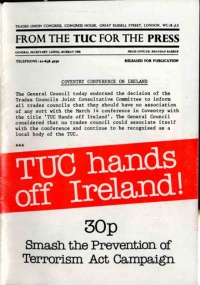
According to former RCP member James Heartfield, the secretary of Tameside trades council at the time Dave Hallsworth was at some point a member of the RCP (though it was still the RCT at the time and it is not clear if Hallsworth joined the RCP before or after the event)
- Dave was secretary of the Tameside trades council at this time, committing it to a policy of supporting Irish freedom and a conference to discuss the Northern Ireland troubles. As a result, the TUC sent its future general secretary John Monks to disband the council.[7]
Publications
The RCT created several strands of publication, one of which was a newspaper, described as early as 1979 as the 'review' of the RCT and titled The next step (without capitalisation). The next step would remain in publication through the following years as the paper (for some time a weekly paper) of the RCP. They also published two series of pamphlets, one of which was titled 'Revolutionary Communist Papers' and was described as their 'theoretical journal'. The RCT apparently also published a bulletin called Hands Off Ireland.[6]
The publisher of all this material was a company called Junius Publications (Company No.: 01339999) which had a date of incorporation of 22 November 1977 (and was eventually dissolved on 25 January 2000 some four years after demise of the RCP.[8]
The list below is compiled from a variety of sources.[9]
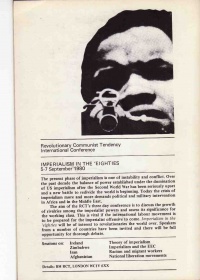
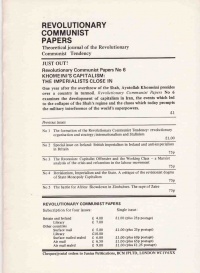
Revolutionary Communist Papers
- The formation of the Revolutionary Communist Tendency: revolutionary organisation and strategy; internationalism and Stalinism, Revolutionary Communist Papers No. 1: March 1977, London: Junius Publications.
- Special issue on Ireland: British imperialism in Ireland and anti-imperialism in Britain, Revolutionary Communist Papers No. 2: 1978, London: Junius Publications.
- The Recession: Capitalist Offensive and the Working class - a Marxist analysis of the crisis and reformism in the labour movement, Revolutionary Communist Papers No. 3: 1978, London: Junius Publications.
- Revisionism, Imperialism and the State: A critique of the revisionist dogma of State Monopoly Capitalism, Revolutionary Communist Papers No. 4: 1979, London: Junius Publications.
- Frank Richards, Alan Harding, Andre Robinson, Peter Wilson, Charles Longford THE BATTLE FOR AFRICA: Showdown in Zimbabwe: The Rape of Zaire: The Scramble for Africa Revolutionary Communist Papers No. 5: 1979 Junius Publications Ltd 48 p.
- Khomeini's Capitalism: The Imperialists close In, Revolutionary Communist Papers No. 6: 1980, London: Junius Publications.
- World in Recession Revolutionary Communist Papers, No 7 July 1981.
- Prolonging the death agony: The rise, fall and reconstitution of social democracy, Revolutionary Communist Papers No.8., Revolutionary Communist Party, Sept 1981.
Revolutionary Communist Pamphlets
- No. 1
- Frank Richards Under a national flag fascism, racism, and the labour movement 2d ed. with new afterword. Published 1978 by Revolutionary Communist Tendency Association in London Revolutionary Communist pamphlets ;, no. 2, 28 p. ;
- Mike Freeman and Kate Marshall, Who needs the Labour Party? Sep 1978 Revolutionary Communist Pamphlets No.3.
- Eden, Fran & Green, Kevin. Racial Oppression : How to Fight It. Revolutionary Communist Pamphlets, No.4. Junius Publications, London 1979, 1st edition., 1979. Pamphlet. Octavo. 26 pages.
- Mary Masters Workers against imperialism : the British labour movement and Ireland. Revolutionary Communist Pamphlets ; no 5 London : Junius, 1979. ISSN 0141-8874 19p
- Higher Education : Fight the Cuts Defend Overseas Students, Revolutionary Communist Pamphlets, No.6. Junius Publications, London 1979, 1st edition., 1979. Pamphlet. Octavo. 12 pages.
- Mike Freeman Ireland's Victory Means Britain's Defeat: the Role of the Labour Movement (Revolutionary communist pamphlets) Revolutionary Communist Tendency Association 1980 Junius Publications Ltd 24p.
- TUC Hands off Ireland. Smash the Prevention of Terrorism Act Campaign. Revolutionary Communist Pamphlets No.8. Junius Publications Ltd, March 1981., 1981. Pamphlet. 17 pages.
- Our Flag Stays Red. East London Workers Against Racism. Revolutionary Communist Pamphlets, No.9. Junius Publications, London 1981, 1st edition., 1981. Pamphlet. 15 pages. illustrated.
- Roberts, Pat & Drury, Christina. Police out of Brixton! South London Workers Against Racism. Revolutionary Communist Pamphlets No.10. Junius Publications, London, 1981., 1981. Booklet. 17 pages, photo illus. Original photo illus.card covers.
- Landa, Inez & Simons, Helen. Ghost Town. Coventry Workers Against Racism. Revolutionary Communist Pamphlets, No.11. Junius Publications, London, 1981. Pamphlet. 13 pages, illustrated.
- Frank Richards, Poland's black December / [Revolutionary Communist Party]. Revolutionary Communist Party (Great Britain) London (BCM, JPLTD, WC1N 3XX) : Junius, c1982. 27 p. : ill. ; 22cm. Revolutionary Communist pamphlets ; no.12
- Mike Freeman, Malvinas Are Argentina's (Revolutionary Communist pamphlets No. 13) [Paperback] Revolutionary Communist Party (Author) Paperback: 32 pages Junius (1982)
Resources
- Gerry Leversha Some Reflections on the 'Revolutionary Communist Group', Marxism Today, January 1978.
- John Sullivan, As Soon As This Pub Closes ..., 1986 RCP.
- John Sullivan Revolutionary Communist Party, Formerly Revolutionary Communist Tendency From John Sullivan, Go Fourth and Multiply/When This Pub Closes, Socialist Platform, London 2004.First published in 1981 by Dialogue of the Deaf, Box 99, Full Marks Bookshop, 110 Cheltenham Road, Bristol 6.
Notes
- ↑ Many accounts date the RCT/P from 1978. This appears to be incorrect. the expulsion from the RCG was in 1976 according to Baker (Blake Baker, The Far Left: An Expose of the Extreme Left in Britain,London: Weidenfeld and Nicolson, 1981, p. 87) as well as according to the RCG itself ('Statement on the expulsion of a chauvinist grouping in the RCG', RCG Executive Committee, Nov 1976) and the creation of the RCT was in 1977, according to Denver Walker (Quite right Mr. Trotsky: Some Trotsky myths debunked, and how Trotskyists today hamper the fight for peace and socialism, London: Harney and Jones, 1985, p. 46) a date supported by Gerry Leversha in a piece published in January 1978 (Some Reflections on the 'Revolutionary Communist Group', Marxism Today, January 1978.)
- ↑ Blake Baker, The Far Left: An Expose of the Extreme Left in Britain,London: Weidenfeld and Nicolson, 1981, p. 87
- ↑ 3.0 3.1 Denver Walker Quite right Mr. Trotsky: Some Trotsky myths debunked, and how Trotskyists today hamper the fight for peace and socialism, London: Harney and Jones, 1985, p. 46
- ↑ 4.0 4.1 John Sullivan Revolutionary Communist Party, Formerly Revolutionary Communist Tendency From John Sullivan, Go Fourth and Multiply/When This Pub Closes, Socialist Platform, London 2004.First published in 1981 by Dialogue of the Deaf, Box 99, Full Marks Bookshop, 110 Cheltenham Road, Bristol 6.
- ↑ 5.0 5.1 5.2 John Sullivan, 'RCP' in As Soon As This Pub Closes ..., 1986.
- ↑ 6.0 6.1 6.2 Gerry Leversha Some Reflections on the 'Revolutionary Communist Group', Marxism Today, January 1978.
- ↑ James Heartfield 'Dave Hallsworth' Obituary, Guardian, 20 December 2007
- ↑ Data at Companies House, accessed 22 October 2010.
- ↑ Sources include documents in the possession of Powerbase; searches on abebooks.com and amazon.co.uk; Hull University Library Catalogue entry Revolutionary Communist papers, accessed 22 October 2010; Linenhall Library, Northern Ireland Political Collection; Irish Left Archive: “TUC Hands off Ireland!” Revolutionary Communist Tendency (UK) – later the Revolutionary Communist Party, c.1981 October 19, 2009